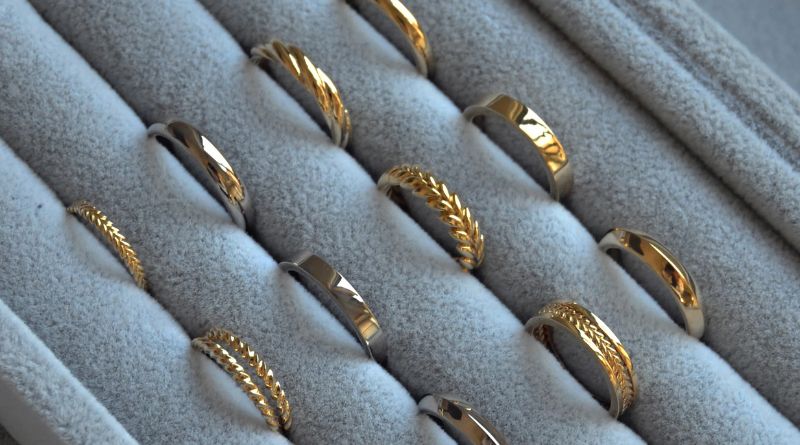When it comes to weddings, one of the most cherished symbols of love and commitment is the wedding ring. These timeless pieces of jewelry not only carry deep personal significance, but they also come with a rich history of craftsmanship and, in many cases, complex ethical considerations. In recent years, ethical wedding rings and jewelry have emerged as an important choice for couples looking to make responsible decisions about their purchases. Whether you’re concerned about environmental impact, human rights, or fair trade, opting for ethical wedding rings ensures that your love story is symbolized by more than just beauty—it reflects values that matter.
Table of Contents
In this article, we’ll explore the concept of ethical wedding rings and jewelry, what makes them different from traditional options, and how you can choose a piece that aligns with your personal values. We’ll also delve into some common questions about ethical jewelry and offer tips for finding beautiful, sustainable options that you’ll cherish for a lifetime.
What Are Ethical Wedding Rings and Jewelry?
Ethical wedding rings and jewelry are pieces that are produced with a focus on minimizing harm to both the environment and people involved in their creation. The ethical jewelry movement stems from concerns over the mining of precious metals and stones, which can often be associated with environmental degradation, labor exploitation, and unethical practices like child labor or unsafe working conditions. Ethical rings and jewelry, therefore, prioritize sourcing materials responsibly, supporting fair wages, and reducing environmental impact throughout the production process.
There are various factors that distinguish ethical wedding rings from their traditional counterparts, including:
- Sustainable Sourcing
Ethical rings are typically made from materials that have been responsibly sourced. This includes gold that’s been mined using ethical practices, diamonds from conflict-free regions, and gemstones that have been obtained through fair trade practices. Sustainable sourcing focuses on reducing environmental damage and supporting communities that rely on mining for their livelihood. - Fair Labor Practices
Many ethical jewelry brands partner with artisans and workers who are paid fair wages and work in safe, humane conditions. This approach ensures that your purchase supports the well-being of the individuals involved in the creation of your jewelry. - Recycled Materials
Some ethical jewelers use recycled precious metals or repurposed gemstones to create new pieces. This reduces the demand for newly mined resources, lowering the environmental impact associated with extraction. - Lab-Grown Diamonds
Lab-grown diamonds, also known as man-made or synthetic diamonds, are another ethical option. These diamonds are chemically and physically identical to natural diamonds, but they are produced in controlled environments with minimal environmental disruption and no association with conflict zones. - Transparency
Ethical jewelers value transparency and often provide detailed information about the sourcing of their materials and their production practices. This level of openness gives consumers the confidence that their purchase supports ethical and sustainable practices.
Why Choose Ethical Wedding Rings and Jewelry?
There are several compelling reasons why more and more couples are turning to ethical wedding rings and jewelry, including:
- Environmental Impact
Traditional jewelry production, particularly diamond mining, can have significant environmental consequences, including habitat destruction, water pollution, and soil erosion. By choosing ethical wedding rings, you contribute to reducing the environmental footprint of the jewelry industry. - Support for Fair Labor
Many traditional jewelry suppliers have been criticized for exploiting workers, particularly in developing countries where labor laws are less stringent. By opting for ethical jewelry, you can support companies that pay fair wages and ensure safe working conditions for their employees. - Peace of Mind
Ethical wedding rings provide peace of mind, knowing that your purchase has not contributed to conflict or environmental destruction. For those who want their wedding rings to symbolize more than just a romantic commitment, choosing ethical options adds an extra layer of meaning to this precious symbol. - Personal Values
Weddings are a reflection of who you are as a couple, and your rings are a lasting reminder of your love and shared values. By choosing ethical wedding rings and jewelry, you’re making a statement about the kind of world you want to build together—one that values sustainability, fairness, and transparency.
Types of Ethical Wedding Rings and Jewelry Options
When it comes to choosing an ethical wedding ring or piece of jewelry, there are several options to consider. Here are some of the most popular choices:
- Fair Trade Gold
Fair trade gold is sourced from mines that adhere to ethical labor standards, ensuring that workers are paid fair wages and work in safe conditions. The gold is often mined using environmentally friendly techniques, and the profits from fair trade gold go toward supporting communities and improving their living conditions. - Recycled Gold and Platinum
Recycled gold and platinum are obtained from old jewelry or other sources, which are then melted down and repurposed into new pieces. This process significantly reduces the need for new mining and helps prevent waste. Recycled metals also come with a lower environmental footprint compared to newly mined gold or platinum. - Lab-Grown Diamonds
Lab-grown diamonds are created in a laboratory under controlled conditions, replicating the natural diamond formation process. These diamonds offer a conflict-free and environmentally friendly alternative to mined diamonds. They are chemically identical to natural diamonds but are often more affordable and have a smaller environmental impact. - Sustainable Gemstones
Ethical jewelers often use gemstones that have been mined with minimal environmental impact or sourced from fair trade suppliers. Some ethical jewelers also offer gemstones that are lab-created, which ensures they are free from exploitation and environmentally damaging practices. - Vintage and Antique Jewelry
Vintage or antique rings are another ethical option, as they don’t require the mining of new materials. Purchasing pre-owned jewelry is a sustainable choice that reduces demand for new resources, while also offering unique, one-of-a-kind designs.
How to Find Ethical Wedding Rings and Jewelry
Finding ethical wedding rings and jewelry can be a rewarding experience. Here are some tips to help you find the perfect piece:
- Research Jewelers
Start by researching jewelers who specialize in ethical and sustainable practices. Look for those who are transparent about their sourcing and production methods. Many ethical jewelers proudly display certifications or details about their environmental and labor practices. - Check for Certifications
Look for certifications such as Fair Trade, Responsible Jewelry Council (RJC), or the Kimberley Process, which verifies that diamonds are conflict-free. These certifications help ensure that the jewelry you purchase meets ethical and sustainability standards. - Ask Questions
Don’t hesitate to ask jewelers about the origins of their materials, whether they use recycled metals, and if their diamonds or gemstones are ethically sourced. A reputable jeweler will gladly provide you with this information and help guide you toward making an informed decision. - Consider Custom Designs
If you’re looking for something truly unique, consider working with an ethical jeweler to create a custom ring. You can choose your preferred materials and ensure that the entire creation process aligns with your ethical values. - Budget Accordingly
Ethical wedding rings and jewelry can sometimes be more expensive than traditional options, especially when you’re opting for high-quality materials like lab-grown diamonds or recycled metals. Keep this in mind as you budget for your wedding jewelry, and be prepared to invest in a piece that aligns with your values.
FAQs About Ethical Wedding Rings and Jewelry
Q1: Are lab-grown diamonds less expensive than mined diamonds?
Yes, lab-grown diamonds are typically more affordable than mined diamonds. They are chemically identical to natural diamonds but can cost up to 40% less, making them a cost-effective ethical choice.
Q2: What is the difference between fair trade gold and recycled gold?
Fair trade gold is mined under ethical labor conditions, ensuring workers are paid fair wages and work in safe conditions. Recycled gold, on the other hand, is repurposed from old jewelry or other sources, reducing the need for new mining and lowering environmental impact.
Q3: Can ethical wedding rings still be beautiful?
Absolutely! Ethical wedding rings and jewelry are available in a wide range of beautiful designs, from classic to contemporary. Many ethical jewelers offer stunning options that rival traditional rings, ensuring that your ring is both beautiful and meaningful.
Q4: How can I ensure the jewelry I buy is truly ethical?
To ensure the jewelry you buy is ethical, research the jeweler’s practices, ask for certifications, and inquire about the origins of the materials used. Look for transparent brands that are open about their sourcing and production processes.
Q5: What are the benefits of buying vintage or antique wedding rings?
Vintage and antique wedding rings are environmentally friendly, as they don’t require new mining. They also offer unique and one-of-a-kind designs, adding a sense of history and individuality to your wedding jewelry.






